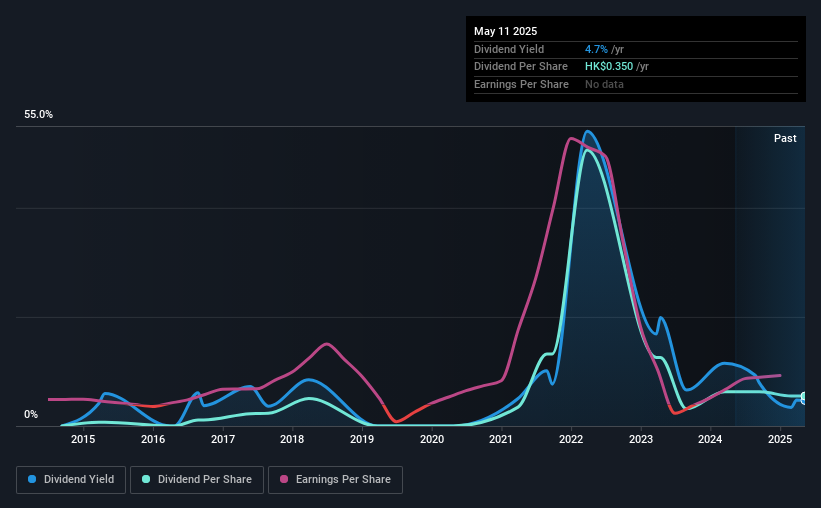
PC Partner Group Limited (HKG:1263) is about to trade ex-dividend in the next three days. The ex-dividend date generally occurs two days before the record date, which is the day on which shareholders need to be on the company's books in order to receive a dividend. The ex-dividend date is important as the process of settlement involves at least two full business days. So if you miss that date, you would not show up on the company's books on the record date. Meaning, you will need to purchase PC Partner Group's shares before the 16th of May to receive the dividend, which will be paid on the 6th of June.
The company's upcoming dividend is HK$0.15 a share, following on from the last 12 months, when the company distributed a total of HK$0.35 per share to shareholders. Looking at the last 12 months of distributions, PC Partner Group has a trailing yield of approximately 4.7% on its current stock price of HK$7.47. We love seeing companies pay a dividend, but it's also important to be sure that laying the golden eggs isn't going to kill our golden goose! That's why we should always check whether the dividend payments appear sustainable, and if the company is growing.
Dividends are typically paid from company earnings. If a company pays more in dividends than it earned in profit, then the dividend could be unsustainable. PC Partner Group paid out more than half (52%) of its earnings last year, which is a regular payout ratio for most companies. A useful secondary check can be to evaluate whether PC Partner Group generated enough free cash flow to afford its dividend. The good news is it paid out just 8.6% of its free cash flow in the last year.
It's encouraging to see that the dividend is covered by both profit and cash flow. This generally suggests the dividend is sustainable, as long as earnings don't drop precipitously.
Check out our latest analysis for PC Partner Group
Click here to see how much of its profit PC Partner Group paid out over the last 12 months.

Have Earnings And Dividends Been Growing?
Companies with consistently growing earnings per share generally make the best dividend stocks, as they usually find it easier to grow dividends per share. If business enters a downturn and the dividend is cut, the company could see its value fall precipitously. That's why it's comforting to see PC Partner Group's earnings have been skyrocketing, up 90% per annum for the past five years. Management appears to be striking a nice balance between reinvesting for growth and paying dividends to shareholders. With a reasonable payout ratio, profits being reinvested, and some earnings growth, PC Partner Group could have strong prospects for future increases to the dividend.
The main way most investors will assess a company's dividend prospects is by checking the historical rate of dividend growth. PC Partner Group has delivered an average of 23% per year annual increase in its dividend, based on the past 10 years of dividend payments. Both per-share earnings and dividends have both been growing rapidly in recent times, which is great to see.
The Bottom Line
Is PC Partner Group an attractive dividend stock, or better left on the shelf? PC Partner Group's growing earnings per share and conservative payout ratios make for a decent combination. We also like that it paid out a lower percentage of its cash flow. PC Partner Group looks solid on this analysis overall, and we'd definitely consider investigating it more closely.
With that in mind, a critical part of thorough stock research is being aware of any risks that stock currently faces. For example, PC Partner Group has 4 warning signs (and 2 which make us uncomfortable) we think you should know about.
A common investing mistake is buying the first interesting stock you see. Here you can find a full list of high-yield dividend stocks.
Have feedback on this article? Concerned about the content? Get in touch with us directly. Alternatively, email editorial-team (at) simplywallst.com.
This article by Simply Wall St is general in nature. We provide commentary based on historical data and analyst forecasts only using an unbiased methodology and our articles are not intended to be financial advice. It does not constitute a recommendation to buy or sell any stock, and does not take account of your objectives, or your financial situation. We aim to bring you long-term focused analysis driven by fundamental data. Note that our analysis may not factor in the latest price-sensitive company announcements or qualitative material. Simply Wall St has no position in any stocks mentioned.